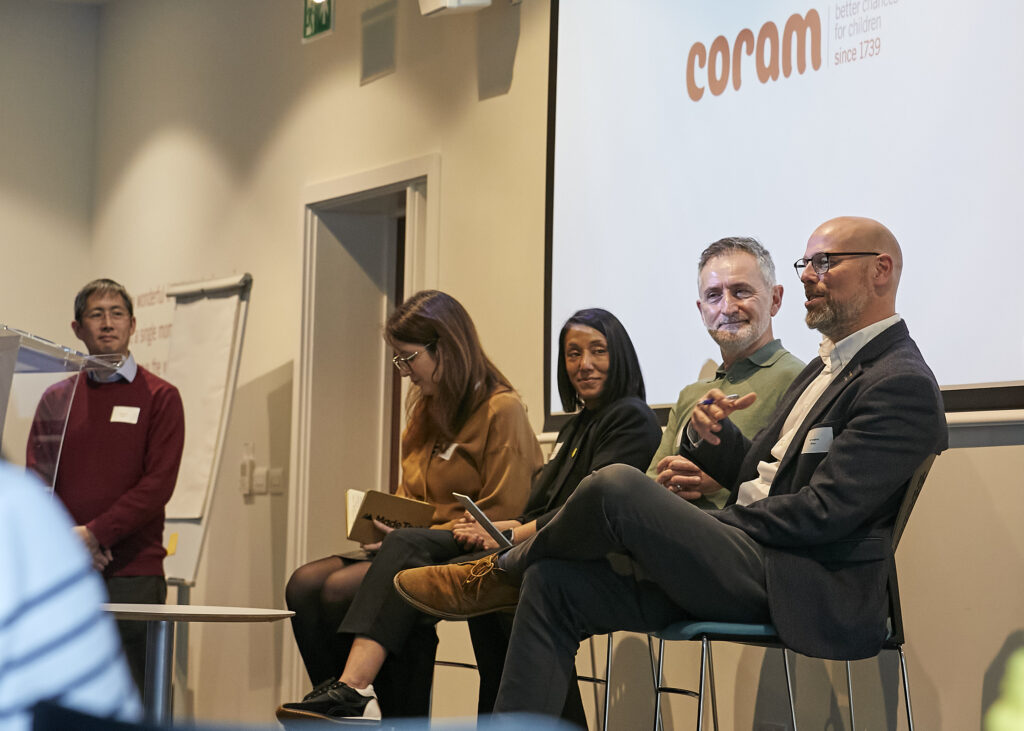Over one hundred children’s sector professionals came together on the Coram campus on Friday 2 February to hear about some of the exciting innovation happening across the country aiming to improve outcomes for children and young people.

The forum marked publication of the Coram Innovation Incubator’s (CII) 2024 Innovation Collective report, highlighting where and how social workers, sector professionals and the private sector are coming together to deliver change.
Opening the forum, Coram CEO Dr Carol Homden, said: “The sector needed a space to come together to find and share innovative solutions to key challenges. In order to move forward we need to step up and actually talk to each other about who is doing what and a with a view to solving which challenge. This is a day to galvanise people and share information about some of the wonderful projects people here today are working on. We are the people we have been waiting for.”
Keynote speaker, entrepreneur Paul Lindley, then shared his insights on how to build a better future for children through innovation. Paul stressed that people and the environment they live in are at the heart of the process: “It is people who have ideas, take action, inspire and innovate. Humans ask ‘why?’ all the time. Environment matters too – our physical and cultural environment shapes us, and I have seen through my work with Mayor of London, Sadiq Khan, the difference we can make having picked up the huge correlation between the rise in fast food establishments and the rise in childhood obesity.” Paul highlighted action now being taken to limit fast food restaurants around schools, restrict unhealthy food adverts on the transport network and to make it easier for children to drink water in school.
Supporting children in care
Jonny Hoyle and Mark Peterson from North Yorkshire Children’s Services set out how North Yorkshire is reimagining case management systems. Their presentation demonstrated how they are using technology to ensure that social workers can more easily identify the ecomap (a tool that shows all the people important to a child, and who potentially able to support and care for them) of a child who is the subject of a child protection plan.
Jonny said: “For a long time we have known that systems are causing difficulties, but we can actually use technology to make life easier for social workers. We have been able to reduce the data retrieval burden on them and support best practice, enabling them to share, analyse and understand complex information far more easily.
“The technology takes all the people involved in a child’s life and gets rid of the information retrieval burden, while the decisions remain entirely with the social worker. It gives you information about the child and means you can potentially avoid distant, disruptive moves and enable them to stay close to people who love and care for them.
Microsoft tools for social care professionals
We were then joined by Andy Coulter and Robin Denton who showed us how Microsoft 365 Co Pilot can help social care professionals in their day-to-day roles and reduce administrative burdens associated with social work. The tool can assist with arduous scheduling tasks, process meeting summaries and assist with crucial redaction work to give dedicated social work professionals back time to spend with children and families. The potential to use the tool to engage with service users in a more accessible way was also highlighted as an exciting opportunity.
Using AI to improve outcomes for children
The last session of the day was a panel discussion considering how AI can improve outcomes for children and families. Kevin Yong, Managing Director of Coram-i, was joined by Aneesa Kaprie, Head of Service for Children and Families Hub, Referral and Assessment, London Borough of Bromley, Jon Brown, Director of Strategic Partnerships, Barnardos and Georgina Maratheftis, Associate Director for Local Public Services at techUK and Dr Fred Langford, Director: Trust and Safety Technology, Ofcom on the panel.
The panel was unanimous in its view that how ever AI is applied in the sector, the focus must resolutely remain on the impact on the child. Georgina highlighted the imperative for organisations to be focused in articulating where AI can add value and what issue it is seeking to solve, which may be around freeing up social worker time by reducing admin. Aneesa spoke about the fact that such technology could provide the valuable space and time for social workers to focus on the child, ‘bringing the joy and love back into social work’. Jon touched on the importance of co-production with children and young people and the opportunity of democratise the process of utilising AI, with cross-collaboration and partnership essential. Fred highlighted a particular opportunity for AI to utilise social media engagement to keep children safe.
The panel spoke about the risks of AI in the sector and potential mitigations. One key risk highlighted was around children being exposed to harmful information online and the importance of regulation and early development work with key actors to ensure the safety of AI models as they are generated. The panel emphasised the importance of PSHE curriculums in schools including modules on online risk and critical thinking to help children to understand the content they are presented with online. The potential of bias in AI software was also discussed from a diversity point of view. Noting the importance of building trust among professionals and children, young people and families, the panel concluded that we need to ensure we are bringing everyone along on the journey to realise the potential of AI in children’s services.
Carol closed the event and reminded us to “Be open to change- it is here in spades.”
Read the 2024 Coram Innovation Collective report
To find out more about joining the Coram Innovation Incubator, please contact innovation@coram.org.uk
